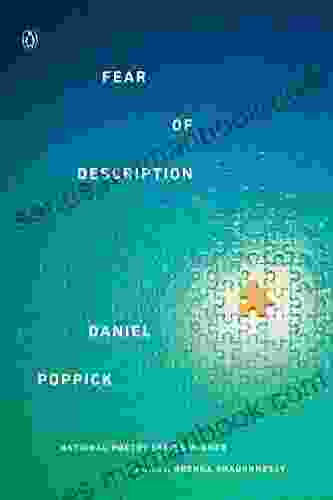Penguin Poets: Unveiling the Fear of Description in Their Poetry

The Penguin Poets, a renowned group of 20th-century poets, have left an indelible mark on the literary landscape. Their bold explorations of language and form, coupled with their keen insights into the human condition, have captivated readers for generations. However, beneath the surface of their celebrated works lies a profound fear: the fear of description.
5 out of 5
| Language | : | English |
| File size | : | 1196 KB |
| Text-to-Speech | : | Enabled |
| Screen Reader | : | Supported |
| Enhanced typesetting | : | Enabled |
| Print length | : | 93 pages |
This fear manifests itself in various ways in their poetry. Some poets, like Wallace Stevens, embrace ambiguity and embrace the inadequacy of language to fully capture the complexities of the world. Others, such as Elizabeth Bishop, find solace in the silence that surrounds the ineffable, while still others, like John Ashbery, grapple with the limits of representation and the fragmentation of reality.
In this article, we embark on a journey through the poetry of Penguin Poets, unraveling the multifaceted nature of the fear of description. Through close readings of their works, we uncover the challenges they faced in capturing the essence of the world through language and the ingenious ways in which they responded to this creative predicament.
Wallace Stevens: Embracing Ambiguity
Wallace Stevens emerges as a poet who confronts the fear of description head-on. In his poem "Description without Place," he declares:
"There is no such thing as the truth about a man. There is only the man. And there is only the truth Of what he believes to be true."
Stevens recognizes the inherent subjectivity of perception and the impossibility of ever fully describing another human being. Instead of striving for an unattainable objective truth, he embraces the ambiguity and complexity of individual experience.
This acceptance of ambiguity extends to Stevens' descriptions of the natural world. In "The Snow Man," he writes:
"The only emperor is the emperor of ice— The only man is the man of snow— Except that he is more than a man of snow."
Stevens' vivid imagery evokes a sense of wonder and mystery. He avoids specific details and instead focuses on the elusive, dreamlike qualities of the snow man. This approach allows the reader to bring their own interpretations and associations to the poem, creating a deeply personal and evocative experience.
Elizabeth Bishop: Seeking Solace in Silence
Elizabeth Bishop, like Stevens, grapples with the limitations of language. However, her response differs. Rather than embracing ambiguity, she finds solace in the silence that surrounds the ineffable.
In her poem "The Fish," Bishop describes a large fish she caught and released:
"We looked at each other eye to eye— Enemy? friend? The old eyes watched Warily, regarded me—a dead thing— Curious, frightened, incredulous, shy."
Bishop's language is precise and evocative, yet it also reveals the impossibility of truly understanding the fish's perspective. The fish remains an enigma, its inner life forever hidden from the poet.
This sense of unknowability permeates Bishop's work. In "One Art," she writes:
"The art of losing isn't hard to master; So many things seem filled with the intent To be lost that their loss is no disaster."
Bishop suggests that the most profound experiences in life may be those that cannot be fully grasped or described. She finds beauty and meaning in the silence that surrounds these experiences, accepting that some things are simply beyond our comprehension.
John Ashbery: Exploring the Limits of Representation
John Ashbery's poetry delves into the very nature of representation and the fragmentation of reality. In his poem "Self-Portrait in a Convex Mirror," he writes:
"The face in the mirror changes, and I change to reflect the change."
Ashbery's mirror image becomes a symbol of his own shifting identity and the unreliability of perception. The reflections and distortions within the mirror challenge traditional notions of representation and call into question the possibility of ever fully capturing one's true self.
This preoccupation with fragmentation extends to Ashbery's descriptions of the external world. In "The Skaters," he writes:
"The skaters flash on the ice, figures eight and arabesques, their legs like scissors, their arms like wings."
Ashbery's imagery is fragmented and disjointed, creating a sense of ambiguity and uncertainty. The skaters become abstract shapes, their movements reduced to a series of disconnected gestures. This fragmented approach reflects Ashbery's belief that reality is inherently elusive and can never be fully represented through language.
The fear of description is a recurring theme in the poetry of Penguin Poets. Wallace Stevens embraces ambiguity, Elizabeth Bishop seeks solace in silence, and John Ashbery explores the limits of representation. Despite their different approaches, these poets share a common understanding of the challenges of capturing the essence of the world through language.
Through their bold experimentation with form and language, Penguin Poets have pushed the boundaries of poetic expression. Their fear of description has become a catalyst for creative innovation, leading to a body of work that is rich in complexity, ambiguity, and profound insight.
As we continue to grapple with the challenges of describing our world, the poetry of Penguin Poets offers us a valuable reminder of the power and limitations of language. It invites us to embrace ambiguity, seek solace in silence, and question the very nature of representation. Ultimately, their poetry challenges us to see the world with fresh eyes, acknowledging both its beauty and its inherent unknowability.
5 out of 5
| Language | : | English |
| File size | : | 1196 KB |
| Text-to-Speech | : | Enabled |
| Screen Reader | : | Supported |
| Enhanced typesetting | : | Enabled |
| Print length | : | 93 pages |
Do you want to contribute by writing guest posts on this blog?
Please contact us and send us a resume of previous articles that you have written.
 Top Book
Top Book Novel
Novel Fiction
Fiction Nonfiction
Nonfiction Literature
Literature Paperback
Paperback Hardcover
Hardcover E-book
E-book Audiobook
Audiobook Bestseller
Bestseller Classic
Classic Mystery
Mystery Thriller
Thriller Romance
Romance Fantasy
Fantasy Science Fiction
Science Fiction Biography
Biography Memoir
Memoir Autobiography
Autobiography Poetry
Poetry Drama
Drama Historical Fiction
Historical Fiction Self-help
Self-help Young Adult
Young Adult Childrens Books
Childrens Books Graphic Novel
Graphic Novel Anthology
Anthology Series
Series Encyclopedia
Encyclopedia Reference
Reference Guidebook
Guidebook Textbook
Textbook Workbook
Workbook Journal
Journal Diary
Diary Manuscript
Manuscript Folio
Folio Pulp Fiction
Pulp Fiction Short Stories
Short Stories Fairy Tales
Fairy Tales Fables
Fables Mythology
Mythology Philosophy
Philosophy Religion
Religion Spirituality
Spirituality Essays
Essays Critique
Critique Commentary
Commentary Glossary
Glossary Bibliography
Bibliography Index
Index Table of Contents
Table of Contents Preface
Preface Introduction
Introduction Foreword
Foreword Afterword
Afterword Appendices
Appendices Annotations
Annotations Footnotes
Footnotes Epilogue
Epilogue Prologue
Prologue Thomas H P Gould
Thomas H P Gould Cynthia Hickey
Cynthia Hickey Marie L Thomas
Marie L Thomas Yusra Laila Visser
Yusra Laila Visser K C Lannon
K C Lannon Jacqueline Klosek
Jacqueline Klosek Brittany White
Brittany White Anusree Roy
Anusree Roy Robert S Harvey
Robert S Harvey Rao Garuda
Rao Garuda Nirmalya Kumar
Nirmalya Kumar Sven Beckert
Sven Beckert Soveressence
Soveressence Illustrated Edition Kindle Edition
Illustrated Edition Kindle Edition James Luceno
James Luceno Erin Litteken
Erin Litteken Melinda Woodhall
Melinda Woodhall Jocelyn Soriano
Jocelyn Soriano C J Cherryh
C J Cherryh Tish Howard
Tish Howard
Light bulbAdvertise smarter! Our strategic ad space ensures maximum exposure. Reserve your spot today!

 Emmett MitchellTurkey Traveller Tales: Unforgettable Adventures and Cultural Immersion in...
Emmett MitchellTurkey Traveller Tales: Unforgettable Adventures and Cultural Immersion in...
 Guillermo BlairMy Lady Beloved Lael St James: A Timeless Tale of Love, Loss, and Redemption
Guillermo BlairMy Lady Beloved Lael St James: A Timeless Tale of Love, Loss, and Redemption Jeffrey CoxFollow ·19.5k
Jeffrey CoxFollow ·19.5k Jamie BlairFollow ·16.5k
Jamie BlairFollow ·16.5k Oliver FosterFollow ·2.4k
Oliver FosterFollow ·2.4k Todd TurnerFollow ·4.3k
Todd TurnerFollow ·4.3k Anton FosterFollow ·18.2k
Anton FosterFollow ·18.2k Lawrence BellFollow ·12.5k
Lawrence BellFollow ·12.5k Edmund HayesFollow ·6.9k
Edmund HayesFollow ·6.9k Gage HayesFollow ·18k
Gage HayesFollow ·18k
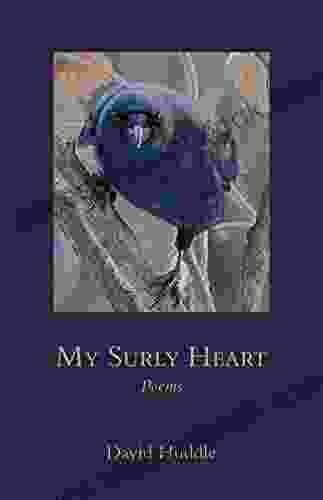
 David Mitchell
David MitchellMy Surly Heart: Poetic Expressions of Unrequited Love...
In the annals of...

 Jake Carter
Jake CarterBleach Vol. 50: The Six Fullbringers - A Comprehensive...
Bleach Vol. 50, titled "The Six...
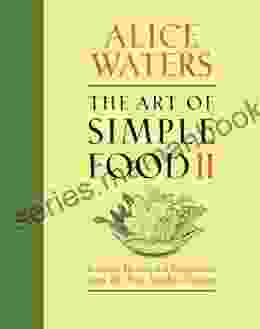
 Edward Reed
Edward ReedThe Art of Simple Food II: A Masterclass in Culinary...
In an era of culinary excess, where meals...

 Jarrett Blair
Jarrett BlairThe Easy Ingredient Ketogenic Diet Cookbook: Your Gateway...
The ketogenic diet,...
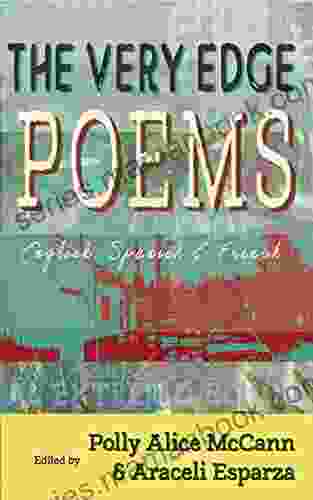
 Larry Reed
Larry ReedThe Very Edge Poems Polly Alice Mccann: A Poetic...
An to 'The Very...
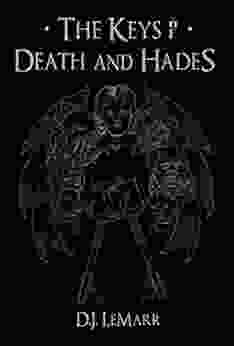
 Sidney Cox
Sidney CoxThe Keys of Death and Hades: Unlocking the Epic of...
In the realm of mythology...
5 out of 5
| Language | : | English |
| File size | : | 1196 KB |
| Text-to-Speech | : | Enabled |
| Screen Reader | : | Supported |
| Enhanced typesetting | : | Enabled |
| Print length | : | 93 pages |


